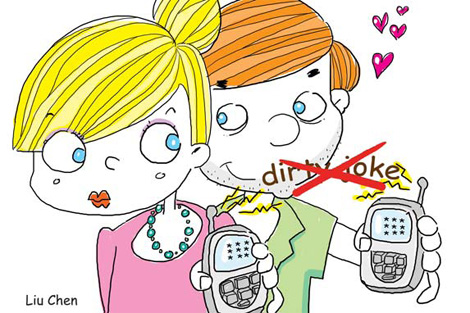Comment
An elephant in the chat room
By Linda Gibson (China Daily)
Updated: 2010-01-27 09:18
 |
Large Medium Small |

Today's English lesson is about an expression that many Chinese may never have heard, but certainly would understand all too well: "There's an elephant in the room."
This doesn't refer to a literal truth, of course. It's a discreet way of mentioning something that everybody knows but nobody wants to mention, a fact so big it's unavoidable and so potentially dangerous it's hard to face. For example, consider the newly announced policy of protecting the public in Beijing, Shanghai and Guangzhou from "illegal" or "unhealthy" text messages.
According to news reports, nine departments of the government made 13 criteria for deciding whether to punish someone for the content of a text message.
If protecting cellphone users really was the goal, the next logical step would be to inform the public of those criteria. Armed with these guidelines, people could continue messaging on an almost unlimited basis by knowing what to avoid.But they have not released details, even to people they've already punished for so-called "bad" text messages.
Without that knowledge, people will be very reluctant to use this previously convenient means of communication. And that's where the elephant in the room becomes hard to ignore.
Under this policy, people will be prevented from using sensitive words. Most likely, Chinese cellphone users will handle this with the same technique used by netizens on blogs and in chat rooms. They'll construct a language of codes.
In this way, both sides can continue to ignore the elephant and still get something they want. Authorities will be able to claim they have eliminated any bad, illegal or unhealthy talk.
Text messengers will still be able to talk about whatever they want and avoid punishment by using innocuous words in ways that carry added meaning.
This is how social order and harmony are preserved - by ignoring the elephant.
Refusing to acknowledge the elephant in the room can work for a long time, but eventually everyone in the room gets buried under huge piles of stinking dung.
The other way to handle it is to announce, "There's an elephant in the room" and deal with it.
This is a risky strategy. Removing an elephant from the room is not easy. Some people inevitably get trampled. It's no dinner party.
Understandably, people most often choose to try to cope with the elephant as best they can without confronting it.
It's the safe choice, but it comes with unpleasant consequences.
By colluding to ignore the elephant, everyone in the room becomes bound by the shared failures of fear and hypocrisy. Of course, this might seem a reasonable price to pay in return for not being trampled.
In addition, some people lose the ability to even perceive the elephant, much less talk about it. They have ignored it so successfully, for so long, that they become indignant when anyone suggests the presence of a large, unwelcome creature.
As the dung piles up, however, the atmosphere becomes increasingly unbearable. There always are some who, sooner or later, will decide that anything is better than putting up with that foul burden.
When they can't breathe anymore, they'll break down doors and smash windows just to get a little fresh air. If the elephant's keepers leave some of those windows open, people might be able to keep on ignoring the beast.










